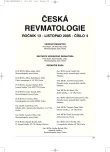-
Medical journals
- Career
Antibodies against citrullinated proteins in rheumatoid arthritis
Authors: J. Vencovský; L. Šedová; Š. Růžičková
Authors‘ workplace: Revmatologický ústav, Praha
Published in: Čes. Revmatol., 13, 2005, No. 4, p. 164-175.
Category: Overview Reports
Overview
Discovery of peptide citrullination, a modification that may contribute to increased antigenicity of proteins, is an important breakthrough in recent rheumatological immunology. Anti-perinuclear or anti-keratin antibodies, which have been known for many years, had high specificity for rheumatoid arthritis (RA). Activity of both antibodies is induced by antibody against filaggrin that contains an unusual amino acid citrullin. Citrullin is not incorporated into peptides during translation but it is produced by deimination of arginine residues in the proteins by peptidylarginine deiminase (PAD), in the presence of sufficient concentration of calcium. Citrullinated proteins, particularly vimentin and fibrin, occur in rheumatoid synovium and represent candidate antigens that can be associated with initiation of the disease. Antibodies against citrullinated peptides appeared to be highly specific for RA (sensitivity around 82%, specificity 98.5%). They can be detected by tests using cyclic citrullinated peptide derived from filaggrin (anti-CCP1) or newly by selected cyclic citrullinated peptides that do not occur naturally (anti-CCP2). Anti-Sa represent antibodies against citrullinated vimentin. Anti-CCP antibodies are found in very early RA, sometimes even before disease onset, and can serve as a diagnostic tool for differentiation of RA from other types of arthritides at the beginning of the disease. Anti-CCP antibodies were associated with more serious course of the disease, faster development of bone erosions, and thereby can represent valuable prognostic marker for RA. In contrast to rheumatoid factors, anti-CCP do not increase a frequency in the elderly, and can be helpful to diagnose RA also in older population. Citrullinated proteins occur also in other types of arthritides but the ability to produce autoantibodies against them discriminate RA from other arthritides. This may be associated with effective binding of citrullinated proteins to HLA DR4 molecules and subsequent break of tolerance. Citrullination of proteins and production of autoantibodies against such antigens is currently very intriguing field of research that tends to identify the role of PAD isotypes, their genetic variability, and the HLA association. Furthermore, the ability of B-cells to produce specific autoantibodies, polymorphism of cytokine genes that can be related to potential of autoantibody production, abnormal citrullination occurrence and other pathogenic mechanisms are the subjects of an intensive research. Since anti-CCP antibodies are more specific and closely related to disease severity, it is suggested that anti-CCP antibodies are going to replace rheumatoid factors in the diagnostic criteria of RA in the near future.
Key words:
anti-CCP antibodies, rheumatoid arthritis, citrullination, anti-Sa, fibrin, vimentin, peptidylarginine deiminase, HLA
Labels
Dermatology & STDs Paediatric rheumatology Rheumatology
Article was published inCzech Rheumatology

2005 Issue 4-
All articles in this issue
- Experience with leflunomide (ARAVA) treatment of active rheumatoid arthritis at clinical practice in the Czech Republic
- Selenium concentration and the activity of glutathione peroxidase in sera of patients with rheumatoid arthritis
- Is it really an inflammatory myopathy? Value of immunohistochemistry of muscle tissue in the differential diagnosis of myositis
- Viral arthritides
- RS3PE syndrom (Remitting seronegative symmetrical synovitis with pitting edema)
- Antibodies against citrullinated proteins in rheumatoid arthritis
- Polyarthritis in a patient with common variable immunodeficiency: a case report
- Czech Rheumatology
- Journal archive
- Current issue
- Online only
- About the journal
Most read in this issue- Antibodies against citrullinated proteins in rheumatoid arthritis
- Experience with leflunomide (ARAVA) treatment of active rheumatoid arthritis at clinical practice in the Czech Republic
- Viral arthritides
- RS3PE syndrom (Remitting seronegative symmetrical synovitis with pitting edema)
Login#ADS_BOTTOM_SCRIPTS#Forgotten passwordEnter the email address that you registered with. We will send you instructions on how to set a new password.
- Career

